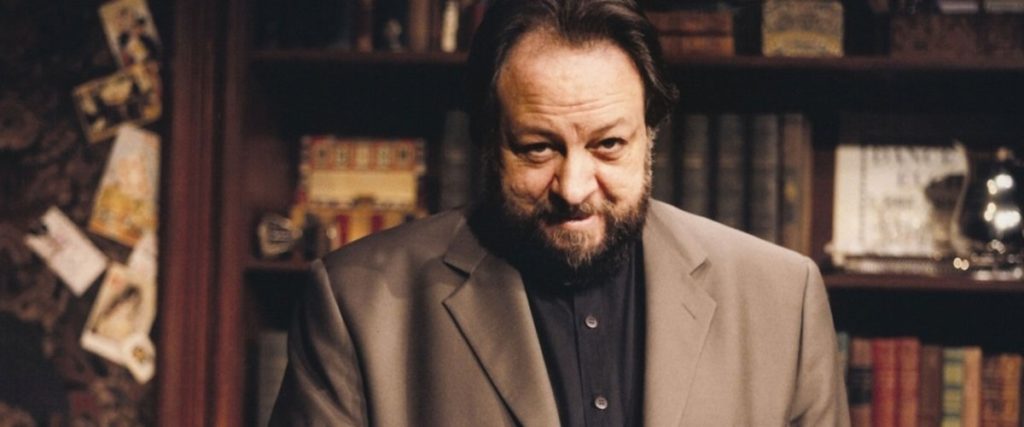Ricky Jay, one of the world’s greatest sleight-of-hand artists, was also an accomplished author, actor, historian, and renowned bibliophile with a library to envy. He died on November 24, 2018. The essay below is adapted from a speech given at a recent memorial service in his honor.
The first time I saw Ricky Jay perform was sometime around 1976, on The Mike Douglas Show. Ricky was beheading roses and puncturing watermelons with one of the simple playing cards that, in his hands, became a deadly missile. He was wearing a three-piece suit but he had a long beard, and hair down to his waist, and my grandmother, watching with me, thought he looked like a degenerate. I thought he was the coolest human I had ever seen, and that impression only deepened when, many years later, I was lucky enough to get to know him. Ricky was an artist and scholar with a fearsome intellect and a biting wit. He was also a surprisingly sweet and gentle soul. The greatest trick I ever performed was fooling him, with my novel The Amazing Adventures of Kavalier & Clay, into thinking that I really knew something about the magician’s art. The greatest of the many kindnesses he ever did me was to not hold it against me when he fairly quickly discovered that I was, in that regard at least, a charlatan.
We met in 2001, when the late Sydney Goldstein asked me to interview Ricky for San Francisco’s City Arts & Lectures, back when it was still at the Herbst Theatre. Ricky seemed a bit weary that night, and as we waited backstage to go on, I found myself thinking about all the hundreds of times that he must have stood there like that, in the darkness, listening to the murmur of the house, waiting for the curtain to open and the footlights to come up.
“You must get tired of it, sometimes,” I whispered to him, “night after night, show after show.”
“Yes, Michael, sometimes I do,” he told me. “But once I get out there, I guarantee you, not you or them or anybody is ever going to know.”
Then the curtain opened, and the footlights came up, and Ricky went out there and killed. Now, when I find myself running out of steam at the ragged end of a book tour, or hanging around some Midwestern JCC green room wishing I were home, I think about the fierce, almost grim underpinnings of Ricky’s glorious showmanship, and it puts iron in my spine.
Though I knew him for seventeen years, I never had the chance to spend as much time with him as I would have liked. So I was, am, and always will be grateful that among those rare occasions was the day I accompanied him—traveled in his wake, would be more like it—to the California International Antiquarian Book Fair. The experience was kind of a cross between walking into a Strip casino with Frank Sinatra in his heyday, touring violin shops in Cremona with Itzhak Perlman, making a circuit of the Tokyo fish market with Jiro Ono, and returning to the North Pole with Santa Claus after a long night’s around-the-world journey. With Ricky’s encyclopedic knowledge, critical eye, connoisseur’s enthusiasm, and some money in his wallet, he was every bookseller’s favorite and most fearsome customer. In my memory, that afternoon is like a number out of some old Broadway musical. The book dealers lined up to bow and purr and fuss over Ricky, opening secret cabinets to bring out some rare tidbit or piece of ephemera they had spent years hunting or tracking down, knowing how much he would love or desire it. People wanted to make him happy. I know I did.
Even more, though, I wanted not to make him unhappy. Whenever I was with him, I brimmed over with questions—about sleight of hand, about the fleas in flea circuses, about Ike and Tina Turner—but I was always worried that he would think they were stupid questions, and that my asking them would make him sad. But they never did, or if they did, he never let on. I loved that about him. The last time we saw each other, over breakfast at the Claremont Hotel in Oakland, I unburdened myself of a potentially stupid question that had been working on me for a while. When the bill came, I took out my credit card, one of those newfangled ones, embedded with a chip and made out of stainless steel, very heavy and, like Ricky himself sometimes, with a bit of an edge. I handed it to him and, remembering that wondrous afternoon all those years ago when I had sat marveling beside my horrified grandmother while Ricky decapitated roses with a three of clubs, I asked him whether he would be able to kill somebody with my Visa card. He frowned, and I thought, Oh no! Stupid question! Then he weighed it, with those implausibly soft, small hands of his, testing its metal edge with the pad of a fingertip. “You know, I think I probably could,” he said, not unhappily at all. He handed it back, with a slight shrug that was not entirely devoid, I thought, of professional pride and the quiet confidence of a true master.
Michael Chabon lives in Berkeley, California.
from The Paris Review http://bit.ly/2RYJKOG

Comments
Post a Comment